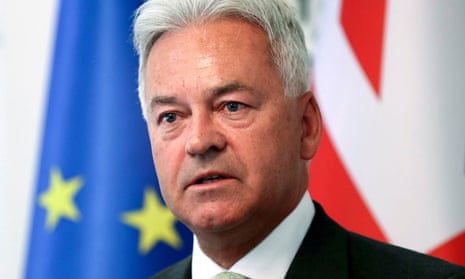The British embassy in Washington backtracked on promises to host a session of the parliamentary inquiry into fake news, because of worries it might offend Donald Trump, the Observer has learned.
Barely a week before MPs from the digital, culture, media and sport committee were due to arrive in Washington for the historic session on 8 February, they were informed in a letter from foreign office minister Alan Duncan that they would have to find a new venue. “We had a report back ... that either the embassy or the UK government felt this would be unhelpful because of the relationship with the US government,” said Ian Lucas, one of the committee members.
The government has sought to bolster ties with Trump since his election, with a view to securing a swift post-Brexit trade deal with the US. But the relationship has deteriorated in recent months, after Trump attacked London mayor Sadiq Khan, retweeted videos posted by the far-right Britain First group, then responded angrily when May criticised him.
Diplomats apparently feared that the committee hearings, which have also touched on possible Russian election meddling, could anger the notoriously thin-skinned president.
“The embassy had been booked for the evidence sessions by staff there, but as the visit got closer it became clear that the ambassador was quite sensitive, because of the president, to the whole issue of ‘fake news’,” said another committee member who asked not to be named.
“There was no intention in the evidence of focusing on Donald Trump, but I personally do understand the ambassador’s sensitivity because he’s got a job to do and there has been quite a bit of friction between Trump and Theresa May,” the committee member said. George Washington University was a better venue, and “not hard to find”, he added.
The Foreign Office confirmed that it wanted to keep a distance between its diplomats and the parliamentary inquiry. “Given the independence of the committee and its inquiry from the government, it would not have been appropriate to hold public evidence sessions in the residence,” a spokesman said. However, he denied that the embassy had made a last-minute reversal, saying use had never been “agreed”.
Committee chair Damian Collins said there were logistical problems but referred questions about the last-minute decision to the Foreign Office. “The embassy wasn’t able to accommodate our requirements, so we looked for an alternative venue,” he said. “We needed a lot of space.”
The ambassador’s residence in Washington is a spacious historic building, and the embassy itself includes the vast Rotunda room, often used to host large public events, including concerts.
It was to be the first live broadcast and public hearing of a House of Commons select committee outside the UK, with the MPs questioning members of the technology industry on their role in promoting fake news and misinformation online.
The embassy’s last-minute decision to prioritise concerns about Trump’s reaction over a historic parliamentary session was slammed by the Labour MP, Ian Murray.
“The fact that our own elected MPs weren’t able to hold a committee meeting at the UK embassy in Washington DC because of fears it would upset the president is, frankly, embarrassing,” said Murray, a supporter of the Open Britain campaign group. “People didn’t vote for Brexit just so we could cosy up to Donald Trump.”
Lucas also said he was unhappy about the last-minute change butwanted to make sure the event took place so that, rather than the focus being on the decision about the venue, it was on getting on with the hearings.
The US-UK relationship under Trump appeared to have got off to a strong start, with May the first foreign leader to visit the White House after his inauguration. But the two leaders do not appear to have a natural rapport, and Trump has shown little interest in ties with London.
May’s first trip was defined by a photos of a bizarre moment when the two walked hand-in-hand, and that turned out to be the highpoint in a relationship that has spiralled downward ever since. She had tried to woo Trump with the offer of a state visit, hosted by the Queen at Buckingham Palace, unusually early in his term of office. But no date was set after it became clear that mass protests would greet any trip, and Trump also cancelled another visit this year, for the opening of the US embassy.
